To view this content, you must be a member of the Rose City Review Patreon
Already a qualifying Patreon member? Refresh to access this content.
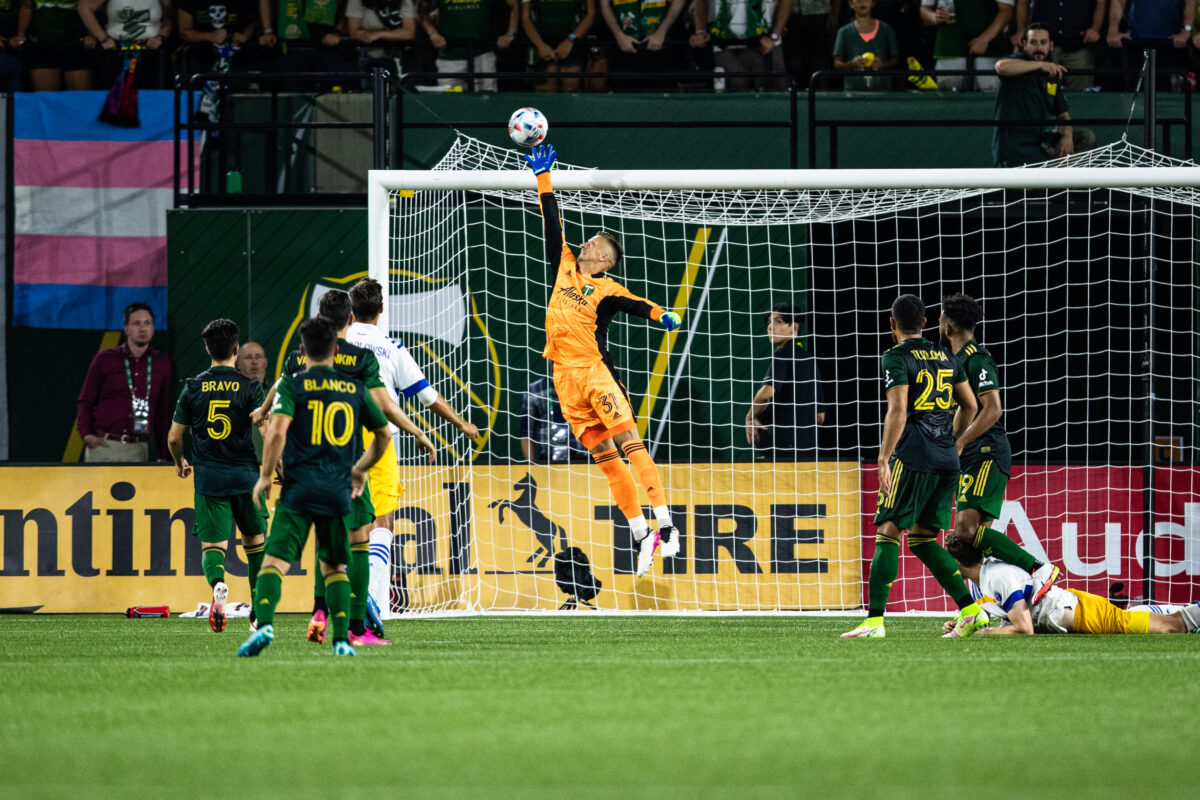
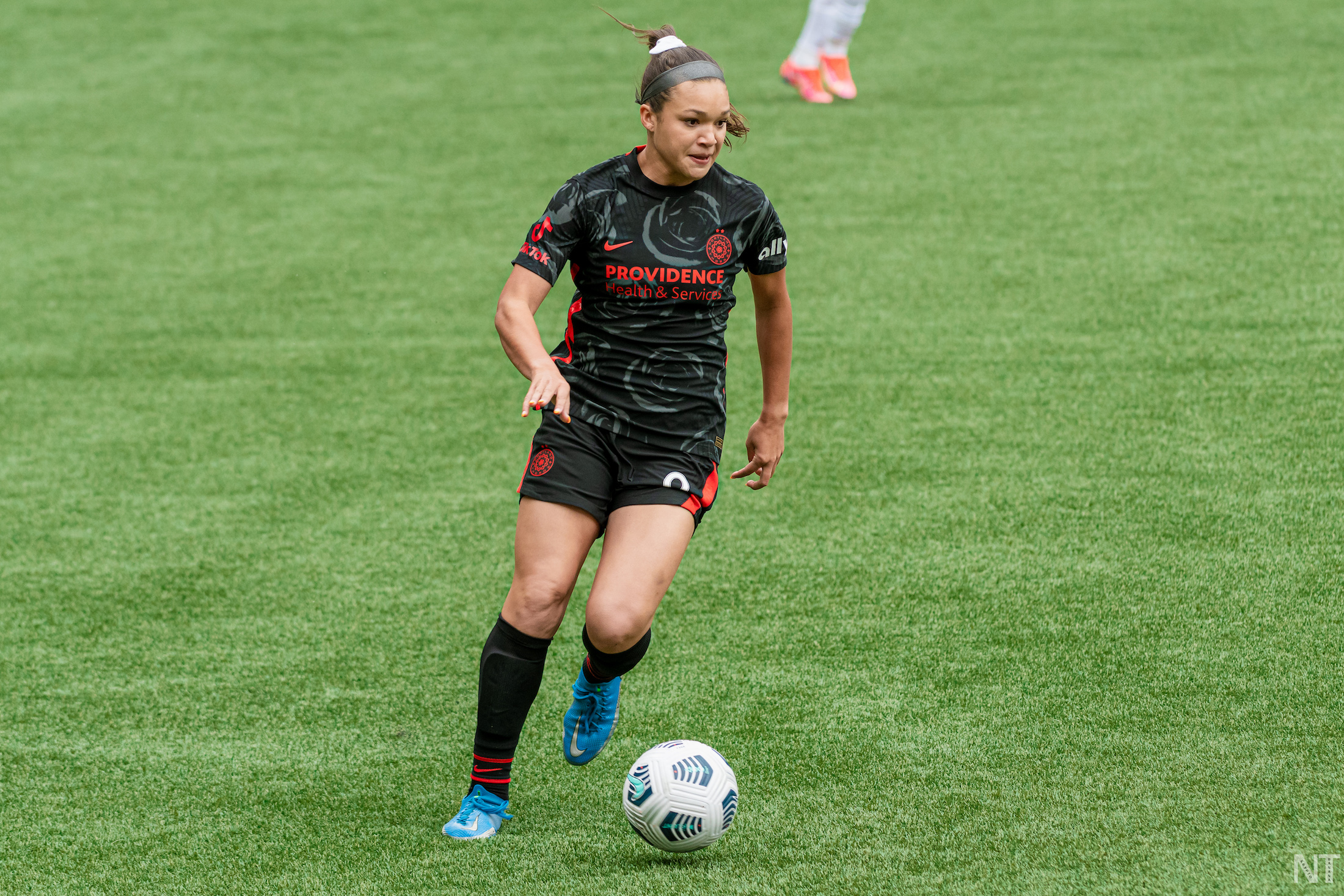
From the second the whistle blew, the Thorns looked like they were going to dominate the Dash, with Sophia Smith scoring the fastest Thorns goal ever 32 seconds into the match. However, Smith’s goal would be the only one that Portland scored that night, holding the Dash to a 1–0 win on the road.
As a team who has “struggled with scoring,” said Kelli Hubly after the match,” it was really special to score early on the road.” Putting themselves on the board early was a needed confidence boost. However, the Thorns struggled to add to that tally, despite playing a great defensive game.
Here are a couple of my takeaways from the match:
The Thorns were dominant against the Pride last week, holding a 2–0 lead for 93 minutes. Then, in the last minute of stoppage time, they conceded on a strike from outside the box. This week against the Dash, the Thorns immediately worked on correcting their mistakes, remaining committed to defense until the very end of stoppage time.
The Thorns led the Dash on duels won, interceptions, tackles, and aerial duels, spread not just across the defense but the midfield and forwards as well. One area of defense where the Thorns did particularly well was tracking back on wide balls that Houston would attempt to play. By preventing players like Jasmyne Spencer and Makamae Gomera-Stevens from getting crosses or passes off inside the 18-yard box after quick turnovers, the Thorns successfully shut down most of the Dash’s shooting angles, giving Bella Bixby an easy job that night. The cohesion between Natalia Kuikka, Hubly, Emily Menges, and Meghan Klingenberg was evident.
After the match, Rocky Rodríguez spoke about the team’s defensive mentality, saying that they “had a lot to lose” and the Thorns “need to get better at closing out games, especially if [they] are winning.” Those last twenty minutes of the game are crucial to securing three points, and players have to keep working hard even as they are beginning to tire. Parsons’s substitutions, which slotted defensive players like Christen Westphal and Meaghan Nally into the midfield to help overwhelm Houston’s offensive-minded substitutions, worked. The Thorns’ game changers came in and locked down the win, bringing accurate passes and high pressure and holding Houston to only 13 shots. Rodríguez’s statement is true—the Thorns do need to work on closing out games—but they’re already showing improvement from last week.
When Sophia Smith set the new club record for fastest goal, it seemed as though Portland was going to have another performance à la the season opener against Chicago, where they went up 4–0 in the first half.
Unfortunately, Smith’s goal was the only one for a Thorns side that has struggled to score in recent games. The Thorns have had no problem getting the ball into their attacking third. Last night, they had 50 more accurate passes in their attacking half than the Dash had on them, even without their midfield of international stars. Rodríguez, Angela Salem, and Celeste Boureille link up in the diamond well, and are able to control the ball and distribute to Smith, Simone Charley, and Marissa Everett, but where the Thorns are struggling is getting off that final cross or shot on goal. All players are rising to the occasion of getting more time than they had been seeing prior to the Olympics, and are beginning to find their groove and consistency with this new starting lineup.
While typically the Thorns outshoot their opponents two to one, against Houston they only registered 14 shots to the Dash’s 13. To the eye, that decrease was clear, with Charley and Smith often taking one too many touches before getting a cross blocked, or a defender crashing on them, neither one of them making an accurate cross on the night. With a team full of talented attackers and a midfield with good rates of distribution and control, there should be more shots on goal. Being able to set themselves up with a wider margin of goals will only complement the Thorns’ defense as they work on closing games without conceding more consistently.

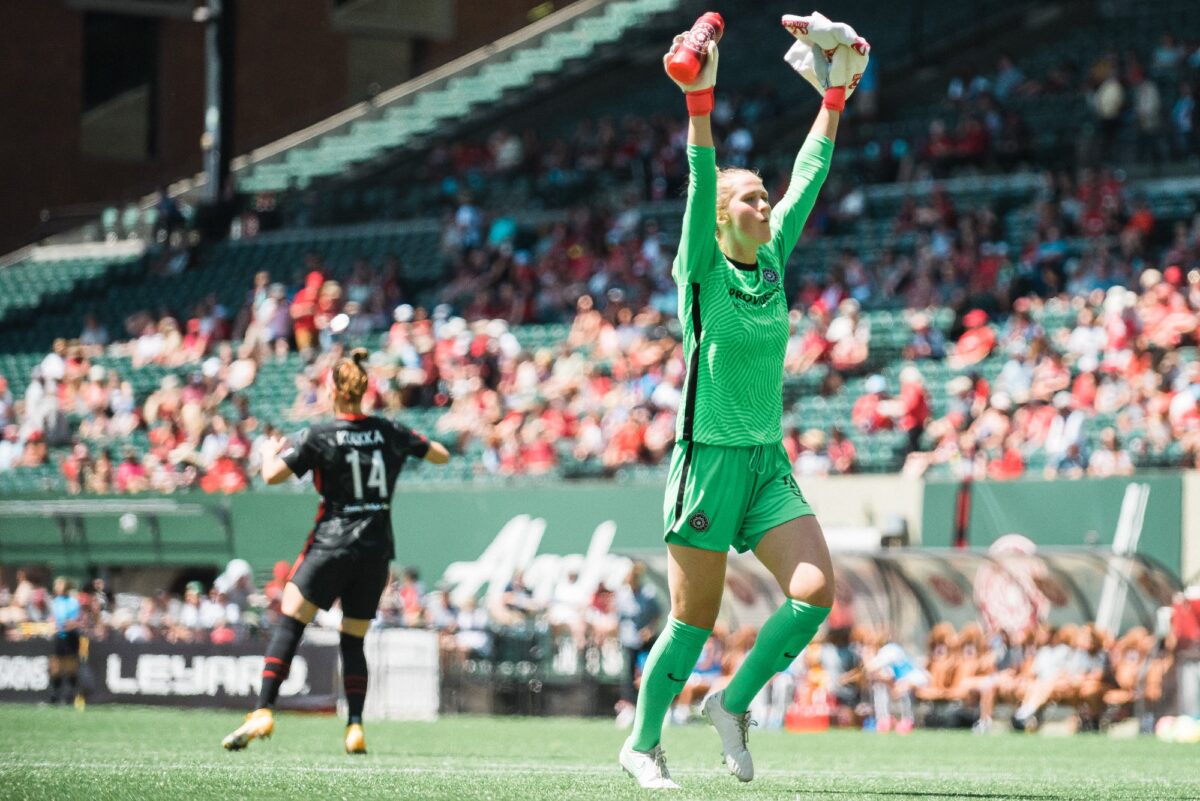
The Thorns bested the Orlando Pride 2–1 on Sunday in a dominant performance capped off with a headed goal by Marissa Everett and a wondergoal by Sophia Smith. Marisa Viggiano’s freakish (in a good way) strike in second-half stoppage time capped the scoring off.
After the game, Mark Parsons pointed out that initially, Orlando stayed compact centrally and tried to keep the Thorns confined to wide areas. Forwards Crystal Thomas and Taylor Kornieck would drop down in the half spaces to help defend, but the Pride generally didn’t try to win the ball back there, instead aiming to keep Portland from passing into the center of the field. Here Kelli Hubly has just received the ball from Meghan Klingenberg. With Thomas and Kornieck flanking Meggie Dougherty Howard, the Pride have blocked off all the passing lanes toward the center.

Orlando did, however, let Portland switch the ball to the weak side. Just after the shot above, Hubly will send a long pass to Natalia Kuikka. The Pride generally didn’t attack the ball when Kuikka or Kling had it.
Because they weren’t challenged much out wide, Kuikka and Kling had a lot of time and space to create from those areas, either sending in crosses or combining with teammates who over- or underlapped them. They ended the game with 89 and 91 touches, respectively, and 51 and 59 passes. That’s around 20 more touches and ten more passes than each of them had last week against Gotham.
In the second half, Marc Skinner reorganized, benching midfielder Erika Tymrak, moving Syd Leroux to the wing, and bringing on forward Abi Kim to play in a 4-4-2 alongside Kornieck. Now the Pride did attack the ball on the wing, including when Kuikka and Kling were carrying it, but they tended to send only one player at a time to do so. That often meant that the two outside backs, who are both strong dribblers, simply bypassed the pressure and found a central pass.
I wrote in my last recap that one of the Thorns’ strengths is the consistency in the way they play each game, especially on the defensive side. They do try to win the ball on the wing (a subject for another post), and are often successful, presumably because the whole team has drilled that trap over and over again.
I’m not sure how you can expect to switch defensive strategies mid-game like Orlando did against a team that specifically does not do that and have things go well—especially, to be frank, given that the Thorns have better players! Outside backs Kylie Strom and Courtney Petersen both got beaten wide by the likes of Morgan Weaver, Smith, and the two outside backs multiple times, outclassed both skill-wise and physically, and looked very frustrated by the end of the first half.
To rewind a bit, when the Thorns don’t succeed in winning the ball on the wing, they know where they’re supposed to run after, and they all do it very quickly—again, presumably because they’ve practiced it a lot.
That’s another problem Orlando had: Portland got a number of good chances on transition simply because the Pride didn’t seem to think of that possibility and didn’t respond fast enough. The setup to Smith’s gorgeous strike is one example of this.
Below, center back Ali Krieger is winding up to take a free kick. Midfielder Dougherty Howard is open, but Krieger—maybe preemptively wary of Smith and Everett pressuring Dougherty Howard from behind?—is going to pass to Petersen, pushed out of frame up on the left wing, where the arrow points.

This one is blurry, so I circled the ball. It wasn’t a good kick, so it’s falling in the direction of the arrow, to the feet of Rocky Rodríguez, not Petersen. It’s hard to tell in the screenshot, but Smith is anticipating where Rodríguez will pass: ahead of her run, into the massive Orlando-free space that’s there because five of the team’s outfield players were just pushing toward goal.
Rodríguez indeed passes there—with a clever first-touch tap—and Smith is basically free and clear to sprint up Portland’s right wing. Petersen chases her, getting in a shove from behind at one point, but Smith keeps running, stays outside Orlando’s stranded center backs, and fires off a sweet right-footed strike from the top of the 18.

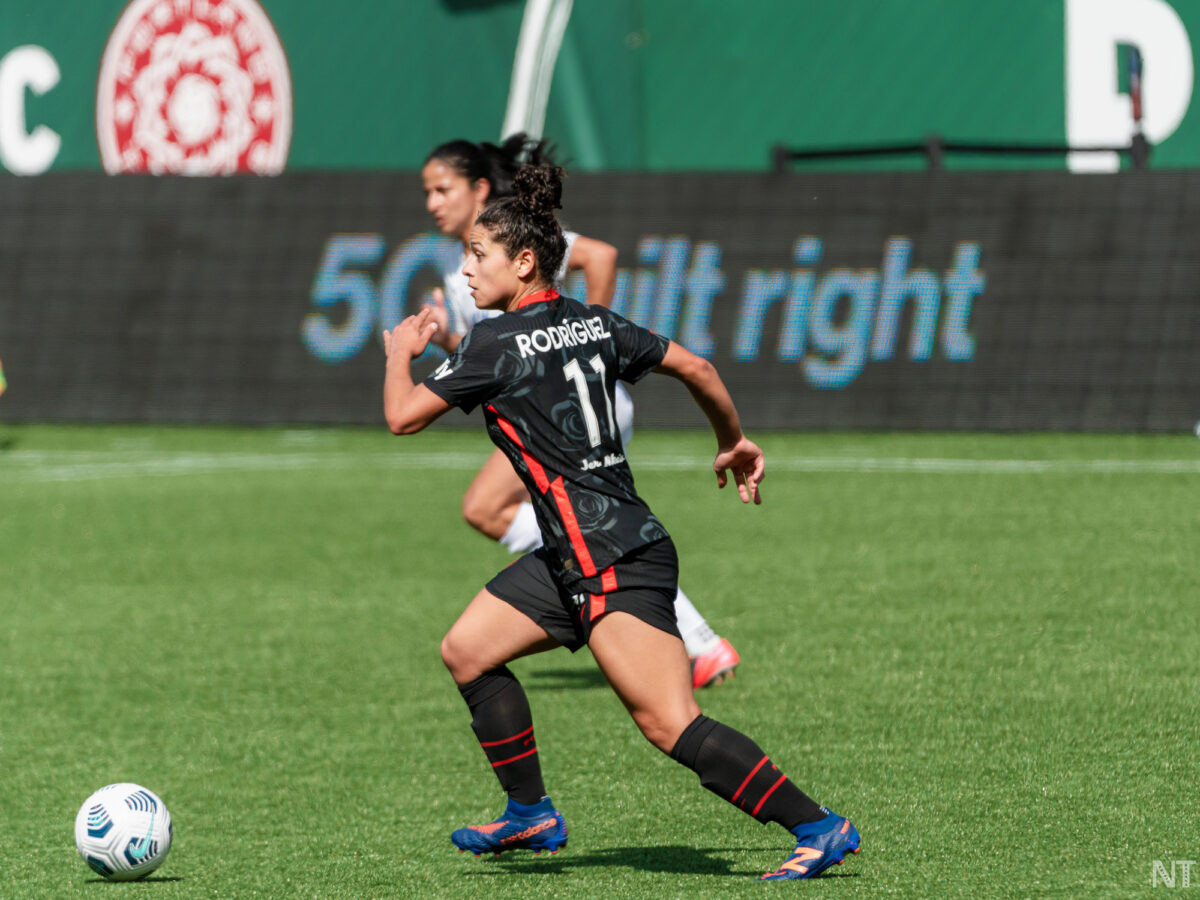
The Thorns earned a comfortable if unspectacular three points on the road today against Racing Louisville FC. With much of the starting lineup away with the US and Canadian national teams to prepare for the Olympics, we saw a return to a B-side Thorns lineup that we’ve gotten pretty familiar with by now.
So far we’ve always done these recaps in a list format, but I don’t feel like doing that tonight, so I’m just going to let this one ~flow~.
Something I find interesting about this iteration of the Thorns is the consistency of tactics from game to game, regardless of lineup or opponent. It’s not like they don’t adjust at all, but they’ve played the same formation since the 2020 Challenge Cup, and their defensive strategy, especially, is very consistent regardless of who’s on the field. This hasn’t always been Mark Parsons’s approach; the first few years I covered the team saw them deploy multiple shapes in each season and use pressing systems that changed depending on player availability.
What’s remarkable about this on the defensive side is that in the past, when the back line wasn’t consistent—often the case when Emily Sonnett and Ellie Carpenter were in and out of national team camps and players like Emily Menges and Meghan Klingenberg dealt with injuries—its performance suffered. But this season has already seen at least as much defensive turnover as any past Parsons season (I think it’s more, but I’m not going to dig up my 2017–2018 notebook to check, sorry), and the team has the third fewest goals allowed in the league, behind North Carolina and the ungodly lucky Gotham FC.
I’m… not sure why that is. It might be as simple as “the team has a lot of depth,” which they do. But it feels like there’s more than that—the press is so organized and effective, and the team’s quality in that area changes basically not at all, regardless of lineup.
Anyway, back to today: we did see some changes, importantly with Celeste Boureille and Marissa Everett slotting in for Lindsey Horan and Christine Sinclair. With Crystal Dunn also out, Rocky Rodríguez and Angela Salem both started, where they’ve been tagging in for each other. Those changes did make a difference offensively; there’s simply no replacing the creative genius those players provide, and the Thorns spent most of their attacking energy moving up the wings, and quite a bit of it sending in aimless crosses. On that point, though, it also has to be said that Louisville did well to stay compact centrally and force the Thorns wide. They didn’t press high, and once they dropped into their defensive block, Portland wasn’t able to break them down.
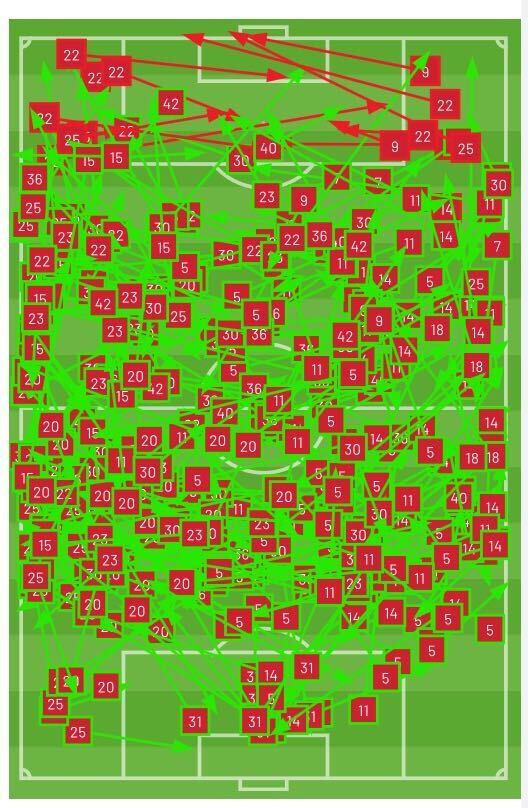
On the other hand—and this brings me back to my earlier point about the defense—Boureille did a bang-up job defensively, notching three tackles and running the length of the field, Horan-like, throughout the 90 minutes. Angela Salem, as always, was a bulldog, shutting down the handful of Louisville attacks that made their way into Portland’s defensive third, and ending the game with four chances created.
The Everett-Sinc difference is even bigger, and probably represents the biggest change in what the team is capable of going forward. Everett does the hard defensive work well, and she managed to get into the box at the right moment a number of times, but she is simply not Christine Sinclair, OC, and she’s not the same kind of link between the midfield and the forwards as the captain is.
So in short, where the full Thorns team can score any number of ways, this lineup was more or less limited to a subset of that toolbox: set pieces, balls over the top, and quick transition plays. They had a few decent looks on transition in the first half, but ultimately either lacked precision in finishing or hesitated too long and couldn’t move the ball fast enough through the final third.
But the goals came anyway, the first from a confidently shot Rocky Rodríguez penalty (after she was fouled off a corner kick), and the second when Simone Charley found the end of a sweet lofted pass by Menges (after a corner kick Kling took short), marking the defender’s first-ever Thorns assist.
The game had been all but over for a while by the time the thing this game will be remembered for happened. Fifteen-year-old Olivia Moultrie usurped Ellie Carpenter as the youngest-ever player to get minutes in an NWSL game when she subbed in for Salem after 83 minutes. And after all the noise around whether she should be allowed to sign a professional contract, the lawsuit, the media blitz, the numberless tweets—perhaps unsurprisingly, she was fine. She didn’t stand out as great, but she didn’t get bodied, either. She won the ball a couple times, lost it a couple, made some passes. Pretty standard stuff for a late-game sub, which is very impressive given her age.


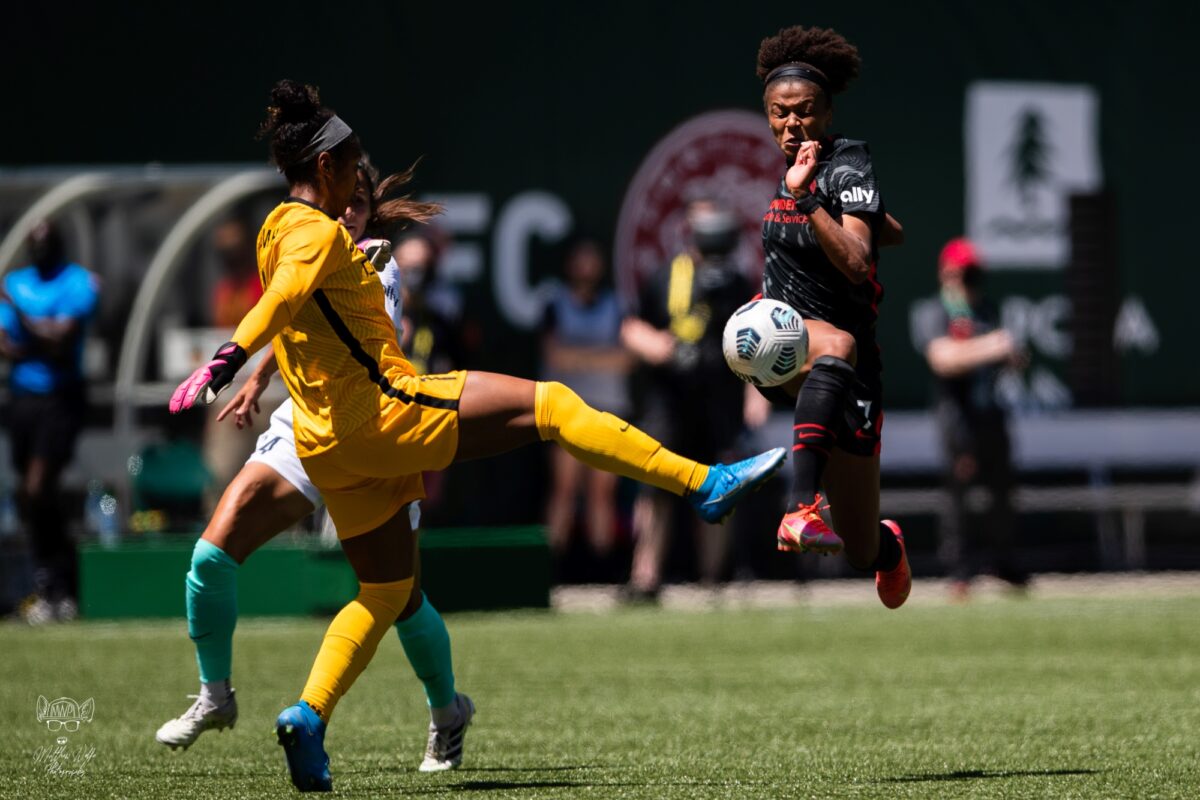
The Thorns held on for the three points on Sunday in a match featuring Simone Charley’s second regular season goal (!!), 80% fan capacity at Providence Park (!!), and some very warm weather for a late June Portland afternoon.
Here are a couple of my takeaways from the game:
I’ve talked a lot about the Thorns and missed chances this year, and I think this game was (hopefully) a turning point in that regard. It’s not that Portland did an especially good job on capitalizing on their chances—they recorded 20 shots on the afternoon, with only one goal to show for it—and it’s weird to say this match marked a shift right before five players step away from the team for the Olympics.
Still, I think Mark Parsons said it best when asked about Christine Sinclair’s missed penalty after the match:
“I think the team were excellent because we missed chances. I think we missed three or four chances that we should score. And I thought, in other games that could affect our decisions. OL Reign or Orlando, when we went through that period, a decision starts to get a bit more desperate, and we were starting to force things or take things on early or not play as fluid, as free in our decision making. I thought it was the opposite today.”
It doesn’t hurt that Simone Charley was the one who scored, either—both because she had the most good looks on goal of any player in the first half and because she’ll still be around through Olympic absences.
“For me personally, it was great to be able to get a goal and use that as momentum going into the Olympic break,” Charley said. “I think you got a taste of seeing how deep our team is, so I’m pretty excited for these upcoming weeks.”
I hope I’m not the only one who saw Sunday’s lineup and immediately thought of the last time Sinc played as a dual No. 9 for the Thorns—specifically alongside Tobin Heath in Portland’s Very Weird last two games of 2019.
Fortunately, things were different this time around. Parsons said Tyler Lussi, Sophia Smith, and Morgan Weaver were all dealing with small injuries going into the match, and Charley had taken some time off during the international break for personal reasons.
(It was probably less fortunate for Elizabeth Ball—both in terms of her team losing the match and in terms of being on the receiving end of an interesting yellow card for “the offense of handling the ball to stop a promising attack,” according to match officials.)
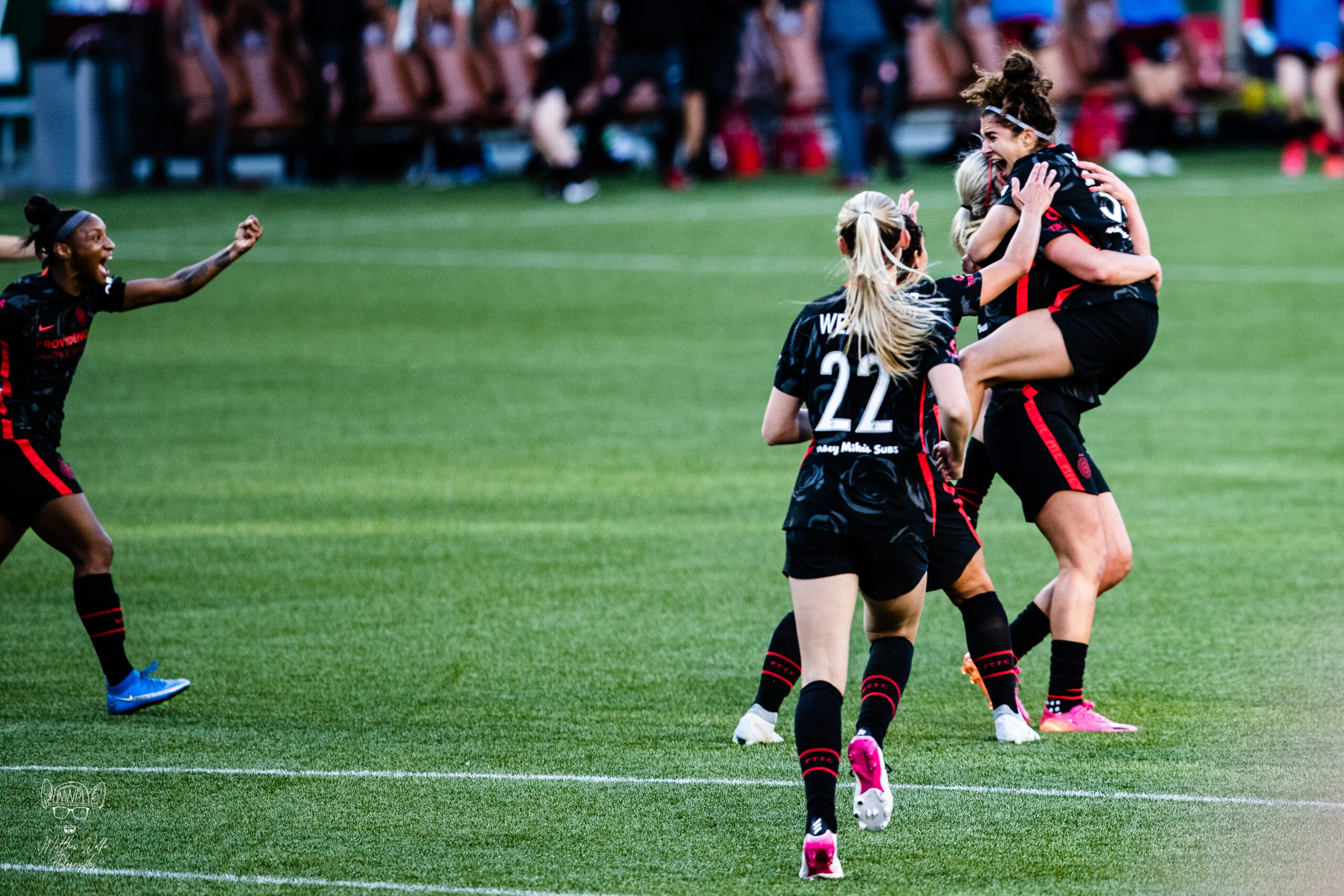
The Thorns coasted to a confident 3–0 win against Racing Louisville last night on the strength of goals by Angela Salem (!!!), Rocky Rodríguez, and Lindsey Horan. Although Louisville struggled to put together much of an attack, it was one of Portland’s most complete performances all year. Even with Christine Sinclair unavailable, their usual game plan worked exactly the way it was supposed to, and just as important, the gals showed progress against their perennial bugbear of ludicrously unlucky finishing.
On the defensive side of the ball, Portland’s press clicked last night better than it has all season, barring maybe the 5–0 Red Stars blowout. They didn’t do anything new, they just looked extremely well-organized at the same scheme they’ve been implementing all season.
In broad strokes, the Thorns’ pressing strategy in the defensive phase consists of encouraging their opponent to move wide, cutting off options into the center of the field, and trapping them on the wings. Here’s an example of how that worked last night:
Clip cortito y editado con energía de domingo, pero cada vez es más y más importante no solo presionar a la pelota, sino presionar espacios y presionar receptoras. Thorns hace esto de manera impecable. pic.twitter.com/OxL9zEM7eq
— Tony ⚡⭐⭐⭐🇦🇷 (@xGisfornerds) June 6, 2021
As Tony points out, most players aren’t pressing the ball here, but constricting the space and limiting Louisville’s options when it comes to passing centrally. After chasing the ball to outside back Emily Fox on the left wing, Fox only has one option, which is to pass backwards to center back Kaleigh Riehl. Riehl, in turn, has no options going forward and has to throw the ball away.
The Thorns also deployed a suffocating counter-press that bore fruit several times—including a moment that led indirectly to Salem’s opening goal in the eighth minute.
The Thorns have just lost possession here, but—because of Rodríguez, Weaver, and Horan cutting off passing lanes, and Simone Charley hovering near Fox—Louisville midfielder Freja Olofsson has nowhere to pass but straight back:
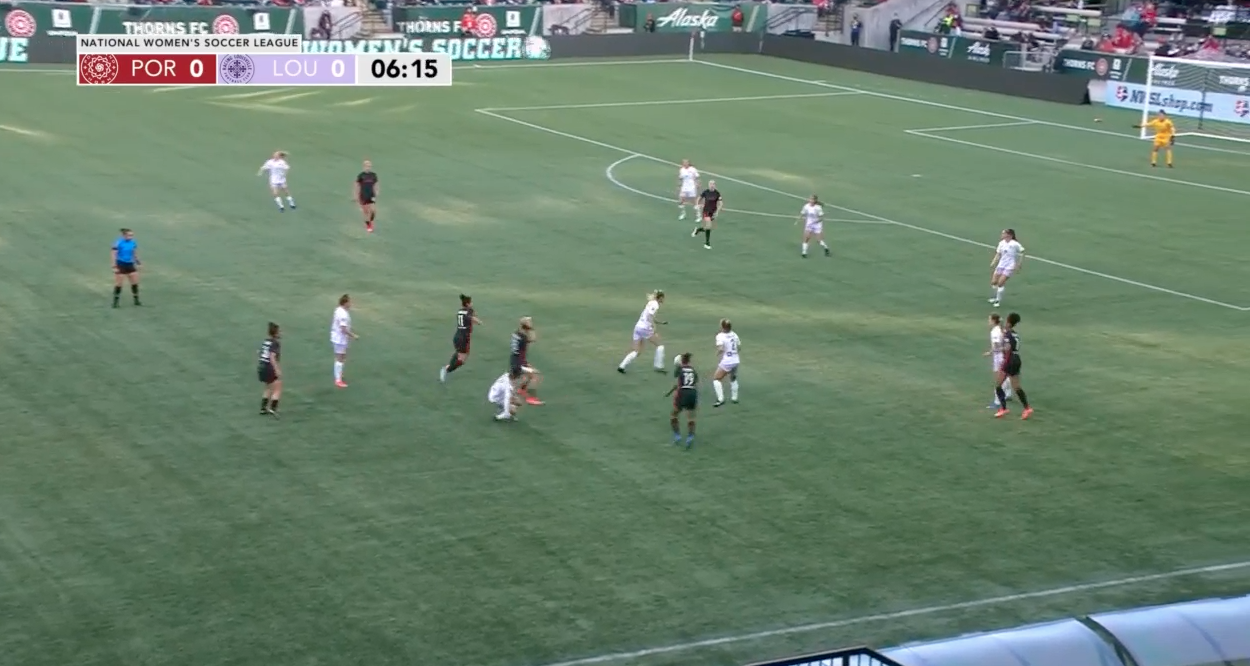
Riehl receives the pass, but quickly gets hemmed in herself, as Weaver and Charley both charge toward her, and Rodríguez and Dunn mark Olofsson and Fox, respectively, eliminating them both as options:
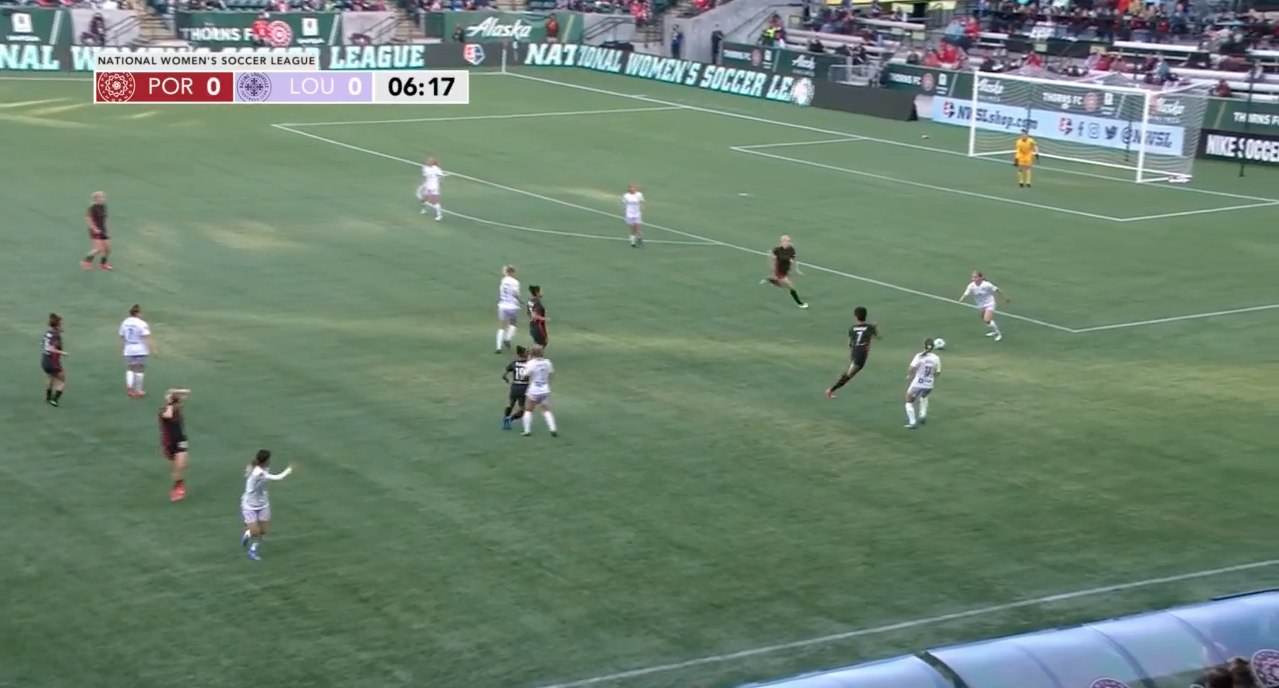
Dunn and Rodríguez close in and, with no remaining choice besides booting the ball to the moon, Riehl dribbles straight into the trap the four Thorns players have created:
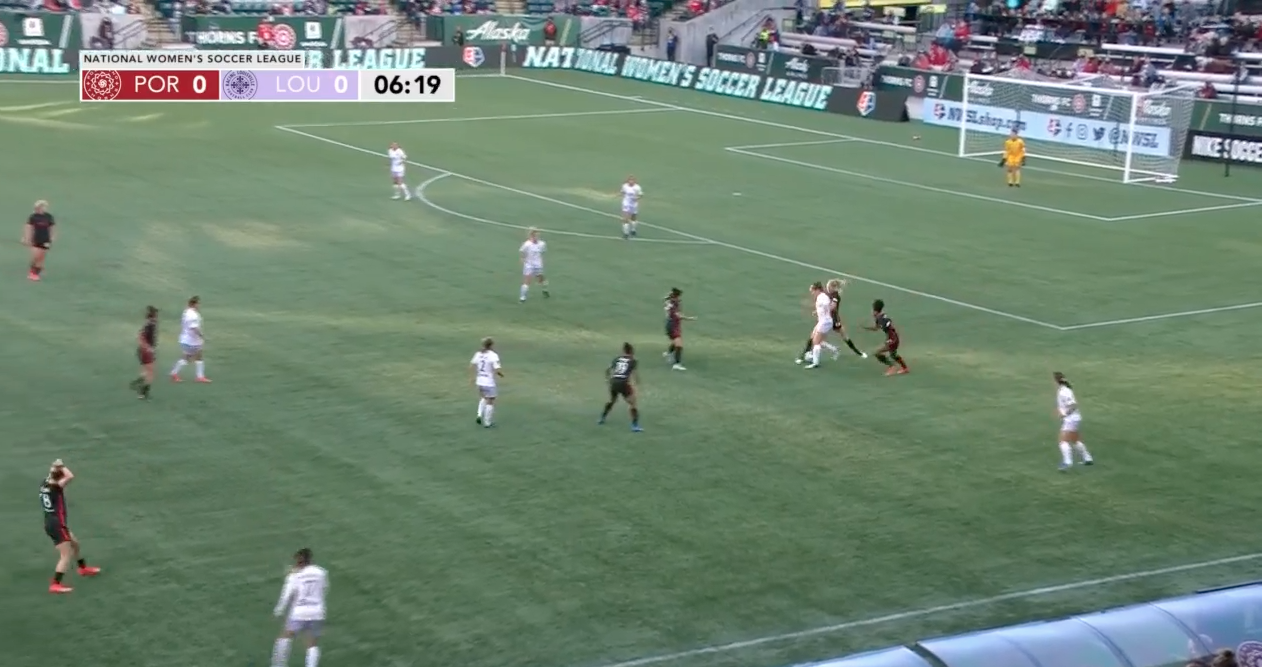
From here, Weaver strips the ball off Riehl, dribbles a few yards to the left, and takes a powerful shot that bounces off a Louisville defender for a Thorns corner. Racing is sloppy clearing the ball on Kling’s initial service, and it eventually falls to Salem, who scores.
The midfield last night consisted of Salem, Rodríguez, Horan, and Dunn, who slotted in for Christine Sinclair as the captain had already departed for the international break. The beautiful thing about this group is that Dunn, Rodríguez, and Horan can all play any central midfield role, so what we saw was quite a bit of fluidity among the group. Dunn, nominally the No. 10, would drop deep fairly often, with Horan and Rodríguez often making runs into the box ahead of her. Salem, the No. 6, had the most restricted role, but still roamed quite a bit.
Heat maps for Dunn (left) and Salem (right) are below:

It’s clear which player is which. Salem, the No. 6, has more actions in Portland’s defensive half (of course, Portland spent most of their time attacking, so no one did a ton back there), while Dunn hung out a lot in the space between Louisville’s midfield and defense, as well as getting into the box. But there’s also non-negligible overlap between the two players; Dunn dropped deeper at times, and Salem also got forward into that same pocket outside the 18.
After the game, Salem noted that the midfield “felt really fluid” and explained the group has been working on their organization, saying, “Sometimes with [our] midfield, we’re not always balanced, because we have such an attacking mindset in there. The focus has really been on just creating balance and holding space and staying disciplined. I think the midfielders all did that tonight.”
Here are the two No. 8s, Horan (left) and Rodríguez (right):

These two have a little less freedom than Dunn, but only horizontally, as each of them mostly sticks to one side of the field. Vertically, they both spend significant time in both halves of the field.
Like the team’s press, none of this is new—what I wrote above is the definition of a box-to-box midfielder—but last night, it all snapped into place in a new way, with everyone choosing their moments to get forward while staying attuned to the movements of the other three and ensuring they weren’t leaving areas of empty space. Salem is the holding mid, but all three of the others could be seen playing deeper than her at times. This is what you get when you put together three players who are all among the best in the world at their preferred position, and almost as good at a handful of others, and give them a few months to train together.
One other thing I want to point out from those heat maps: Horan? She does a lot! We all know this, but even if you know it, she does more than you probably realize.
This was another very lopsided match: The Thorns registered 28 shots to Louisville’s 4, putting 12 on frame. Louisville had zero shots on target.
As dire as Racing’s offense was, however, it’s also worth noting that defensively, they put up more of a fight than Chicago in their big loss, or the Reign in their Challenge Cup match. Obviously, they didn’t succeed in stopping Portland’s attack, but there was visible organization in their press, so it’s not like they rolled out the welcome mat for the Thorns. In the first half, they won 25 duels to the Thorns’ 17. That dropped to 23 and 26, respectively, in the second half, likely as Louisville’s arduous journey to Portland caught up with them.
Finally, Portland significantly out-possessed and out-passed their opponents: 59.6% to 41.4%, and 517 to 375 total passes, respectively. As with the duel numbers, the second half was substantially more lopsided in both respects.